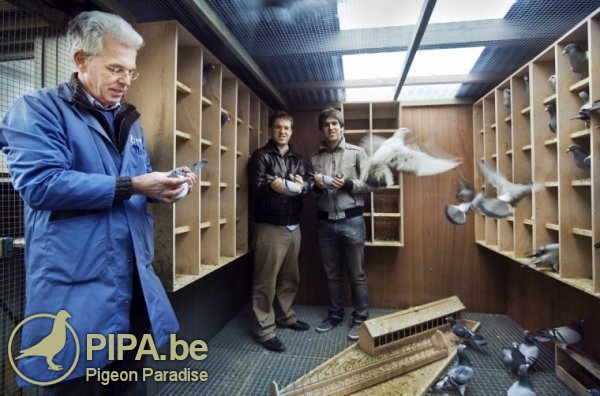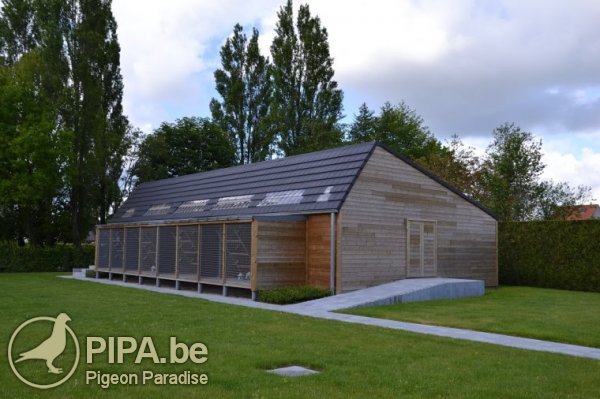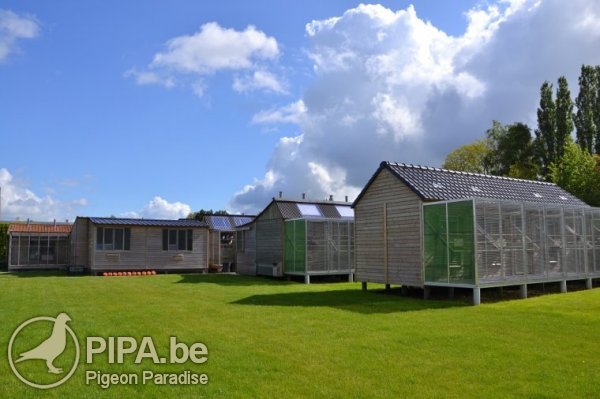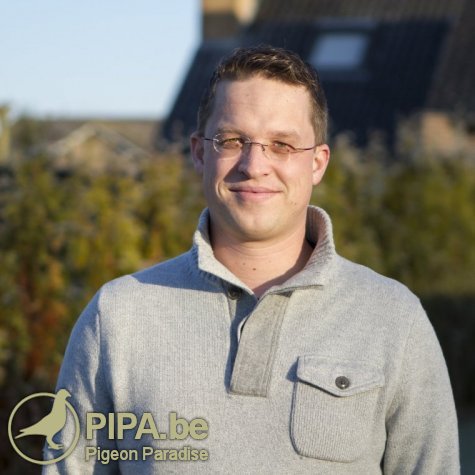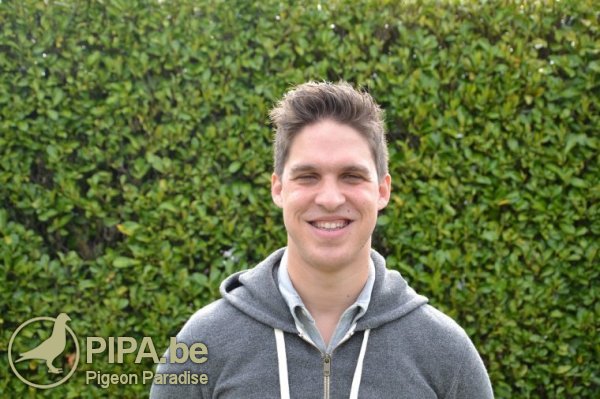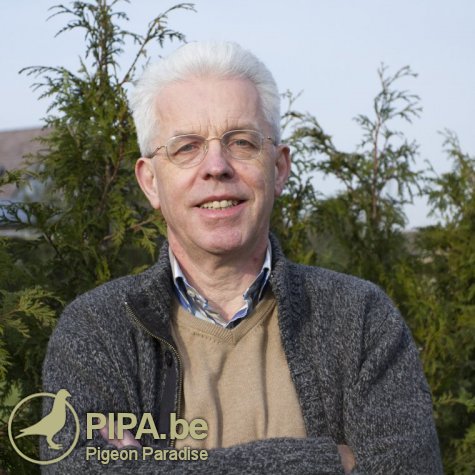The Basis
It all started with Maurice Gyselbrecht from Knesselare, an ordinary pigeon fancier from the second half of the 20th century. His son Remi Gyselbrecht took over his father’s loft and soon became a renowned player, thanks to a number of impressive results in the 1960s and ’70s. Remi (born in 1925, died in 2011) has four sons, Carlo, André, Georges and Johan (†). Carlo, André and Georges inherited their father’s love of pigeons. Nikolaas and Thomas, Carlo’s sons and the founders of PIPA, are thus the fourth generation of pigeon fanciers.
It was probably during one of my trips to Belgium in the mid-1980s that I paid a visit to Remi Gyselbrecht from Knesselare. Back then, I was interested in every successful pigeon loft in Belgium. Remi Gyselbrecht was incredibly strong at the time, winning several provincial first prizes and the title of Belgian Champion Long Distance in 1977. One of his most successful pigeons was “Vooruit”. I still have a number of race reports and Remi Gyselbrecht’s business cards in my archives, to remind me of my first visit to Knesselare.
It was during that same trip that I met Dr. Carlo Gyselbrecht and his youngest son as well. This son must have been Nikolaas, whom there was not a lot to be said about. Let’s go back to Remi and his sons Dr. Carlo and André Gyselbrecht. They continued to achieve great results, including a 4th national prize from Barcelona, before fulfilling the dream of any long distance fancier: they won the international first prize from Barcelona against 20,925 pigeons in 1995. It was an impressive achievement. Three years later they also won a 2nd national prize from Barcelona against 13,996 pigeons, which shows that their international win was no coincidence.
Back to Dr. Carlo Gyselbrecht (°1951) and his two sons Nikolaas (°1980) and Thomas (°1985). It was Nikolaas who eventually gave way to PIPA’s success story that began in 1999.
The beginning
Nikolaas began his hobby project in pigeon racing in 1999. He started collecting the most recent pigeon related news stories, which he then published online. He continued to bring more and more news, before eventually launching his own website called PIPA. It proved quite difficult to run the website on his own, which is why Carlo’s friend Martin Degrave offered his help in 2001. In the following year PIPA gradually developed into a household name in pigeon racing globally. Nikolaas became the public face of the company, while Martin was the driving force behind PIPA’s news coverage. PIPA stands for Pigeon Paradise, the initial name of his website. PIPA is easier to pronounce than Pigeon Paradise, hence the abbreviation. PIPA was initially a hobby project but it has grown to become a professional company which is now called PIPA Holding BVBA. Its associates are Dr. Carlo, Nikolaas and Thomas Gyselbrecht.
PIPA’s objectives
To inform pigeons fanciers worldwide about the latest pigeon related news from around the world, and from Belgium, The Netherlands and Germany in particular.
To support fanciers across the world.
To offer for sale pigeons of utmost quality by organising both online and offline auctions, as well as public auctions.
To preserve the very best genetic bloodlines, or to put it another way, to bring together top quality breeding pigeons either in the PIPA Elite Center (middle distance and one day long distance) or in Dr. Carlo Gyselbrecht’s loft (extremel ong distance), and to further improve these bloodlines using well-considered pairings.
How to reach these objectives
By promoting pigeon racing in Belgium, The Netherlands and Germany, in other European countries and all across the world. PIPA focuses primarily on Belgium, The Netherlands and Germany, the countries of origin of pigeon racing.
By keeping you up to date with the latest news, and by bringing correct and detailed reports about our sport, especially from Belgium, The Netherlands and Germany.
By keeping you up to date with the latest news from all other countries involved in pigeon racing as well.
By bringing pigeon fanciers closer to each other through PIPA’s international forum, which enables them to communicate and exchange information.
By selling nothing but the best pigeons, pigeons that allow fanciers to win prizes across the world.
PIPA’s key activities (Pigeon Paradise)
An online newspaper (the biggest in our sport worldwide)
An exclusive online auction platform for top quality birds
An exclusive offline auction platform for top quality birds
Organiser of public auctions with top quality birds
Breeding and preserving exclusive pigeon breeds in the PIPA Elite Center
Their conclusions:
PIPA does not want to be just any news website, they want to provide correct and detailed news reports about the latest events in our sport.
PIPA does not want to sell just any pigeon, they only want to sell pigeons of utmost quality.
PIPA does want to breed just any pigeon, they want to breed top class pigeons that meet the highest standards.
Milestones in the history of PIPA
Let’s run through the history of PIPA over the past 15 years, from its very beginning all the way to their current activities. This success story was made possible only by the pioneering spirit and the inventiveness of Nikolaas and Thomas Gyselbrecht.
1999:
Nikolaas Gyselbrecht starts to provide the latest news about pigeon racing worldwide.
2000:
Nikolaas launches www.pipa.be, enjoying the support of his father Carlo and Carlo’s friend Martin Degrave, who becomes responsible for the entire editorial team.
2003:
The daily news updates on the spread of bird flu in Europe makes PIPA a widely known website.
The very first pigeon is sold online at a set price.
2004:
Nikolaas’ brother Thomas and Luna, PIPA Agent for China, start working together. Thomas streamlines the auctions, Luna tries
to turn PIPA into a household name in China.
2005:
Jewels of the Sky, an auction with pigeons from the most well known and most successful European fanciers, is organised for the very first time.
2006:
PIPA organises its first public auction.
2007:
Martin Martens, auctioneer in PIPA’s first public auction in 2006, becomes the company’s first permanent employee.
2008:
PIPA Elite Center (PEC) is founded, PIPA’s own breeding loft.
Fanciers can submit their times of arrival in national races on PIPA. This enables visitors to watch the race live.
2009:
The Ludo Claessens auction is PIPA’s first major success, raising a total of 905,000€.
The public auction of Erik Limbourg raises 1,252,000 €.
A new website is launched.
The Club module is launched, enabling clubs to keep their members up to date.
2010:
A radar enables fanciers to locate the earliest arrivals.
The public auction of Jos Thoné raises 1,323,780 €.
The online auction of Dr. H.P. Brockamp raises 1,017,750 €.
2011:
The public auction following the passing of Pros Roosen raises 1,368,000 €.
The online auction of Verreckt-Ariën raises 971,800 €.
PIPA publishes Collector’s Edition I, a book in which Europe’s most successful fanciers are presented.
A completely new auction platform is launched. Buyers can now place a bid online without first having to contact PIPA.
2012:
DNA samples are taken to give the buyer absolute certainty about the origins of a pigeon.
The online auction following the passing of André Verbesselt raises 1,282,400 €.
The online auction of Pieter Veenstra raises 1,899,300 €.
The online auction of Etienne Meirlaen raises 1,159,700 €.
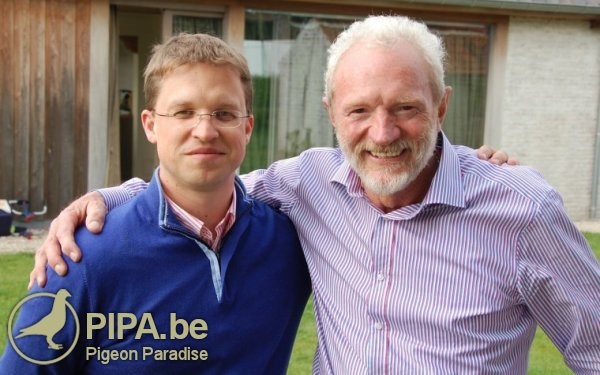 Nikolaas Gyselbrecht and Leo Heremans
Nikolaas Gyselbrecht and Leo Heremans
2013:
Every pigeon that will be sold in auction receives an assessment report, in which all outside characteristics are listed.
PIPA sets two new world records with the Leo Heremans auction: the world’s biggest online pigeon auction and the world’s most expensive pigeon
(Bolt, sold for 310,000 €).
The online auction of Leo Heremans raises 4,346,500 €.
The online auction of Marc De Cock raises 1,273,300 €.
2014:
PIPA builds a brand new and spacious new breeding loft for its PIPA Elite Center.
The PIPA website gets an entirely new layout.
Over the years PIPA has organised quite a number of highly successful online and public auctions.
The men behind PIPA
We have talked quite a bit about PIPA and the men behind PIPA, who we mentioned earlier: Dr. Carlo, Nikolaas, and Thomas Gyselbrecht. They each have their own set of responsibilities within the company.
Nikolaas Gyselbrecht
We start with the founder of PIPA. He is the one who laid the groundwork for PIPA at a young age. He founded his website Pigeon Paradise in 2000, which was nothing more than a hobby project. The idea behind his project was to keep pigeons fanciers across the world up to date about the latest developments in Belgium, The Netherlands and other neighbouring countries. This website continued to be a hobby for the next three to four years before gradually developing into a real company that is now specialized in auctioning exclusive pigeons. That does not mean PIPA no longer provides news reports. PIPA continues to keep us up to date about the latest international developments in pigeon racing, but they also auction exclusive pigeons, and they are breeding their own top class pigeons as well, although only to a certain extent. In addition, PIPA is always looking to add highly exclusive pigeons to their PIPA Elite Center.
PIPA has been online for over 15 years now, and it have been great times. There have been a few sensational auctions, and over the years PIPA has managed to become one of the market leaders. They are the number one worldwide, which is something to be proud of. For instance, their Leo Heremans auction in May 2013 was the most successful pigeon auction ever, and it actually included the most expensive pigeon that has ever been sold. PIPA has organised the ten most lucrative pigeon auctions ever, and it has also sold the ten most expensive pigeons ever. This is something they can be proud of.
PIPA wants to continue bringing interesting new innovations. They want to auction pigeons of excellent quality, pigeons that have been carefully selected. They closely examine every pigeon and their pedigree but they will also take into consideration the fancier behind the pigeon.
Nikolaas wants to make sure that both the seller and the buyer are satisfied, and he wants all employees, freelancers and PIPA agents to be enjoying their work at PIPA. The goal is to ensure that PIPA continues to be a pleasant and enjoyable working environment in the future as well.
Thomas Gyselbrecht
PIPA has published a very interesting DVD that includes an introduction to its managers and employees.
This is how Thomas Gyselbrecht introduced himself:
I am Thomas Gyselbrecht, sales manager at PIPA. The sales department takes care of everything that concerns our online auctions.
This means we are involved in the first contact with the fancier interested in selling pigeons, all the way to the closing of the auction. Everything in between is the responsibility of the sales department.
I work closely together with two groups of people: the first group consists of the PIPA agents, who form the bridge between PIPA and the fancier involved. We have an agent for the most important regions which PIPA obtains pigeons from. This includes Belgium, The Netherlands, Germany and Great Britain. The second group is our internal sales team. It is their job to make sure that every auction runs smoothly and correctly.
Over the years we have learned a lot about the demands of our clients, the people that buy pigeons on PIPA, and about the standards that a pigeon should meet before it can be sold in auction. It is not our intention to determine which ones are good and which ones are bad, because no one can. Instead, we aim to provide an objective description of every pigeon, and to list all outside characteristics, so that the buyer knows what type of pigeon he will be getting. This has been made possible thanks to our special assessment method.
Dr. Carlo Gyselbrecht
He is the father of Nikolaas and Thomas, and he also introduced himself on the DVD:
I am Carlo Gyselbrecht, father of Nikolaas and Thomas. Before PIPA was founded I worked as a veterinary surgeon, with pigeon racing being my great passion. I was fortunate to have bred an international first prize winner from Barcelona, as well as a 2nd and 4th national Barcelona in Belgium. When PIPA was founded, I closed my veterinary praxis to put all my energy in PIPA.
I had several responsibilities within PIPA. We had to perform many administrative and financial tasks, and so we had to start hiring people. The lofts played a crucial role as well. The pigeons that were kept here had to be kept in great health. This was quite a demanding task for me. We agreed with other vets and professors to draw up a program that aims to keep our pigeons healthy. This is to make sure that the pigeons are in optimal health when they reach their new owner. This is still my number one responsibility today: managing the lofts and overlooking the pigeons’ health.
You have now been introduced to the Gyselbrecht family, an interesting family with a great love of racing pigeons. It goes without saying that the three of them cannot run this company on their own. Over the years, an increasing number of employees and freelance workers have joined PIPA, to serve the interests of pigeon fanciers from all across the world.
We suggest you take a closer look at the PIPA website. Perhaps you might come across a useful piece of information. Just clickwww.pipa.be.
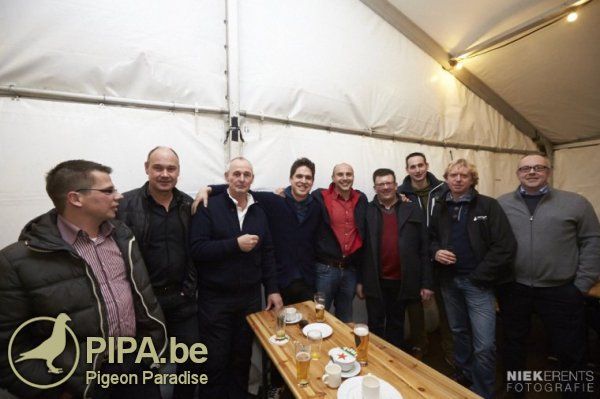 Thomas Gyselbrecht amid some other successful pigeon enthousiasts.
Thomas Gyselbrecht amid some other successful pigeon enthousiasts.

